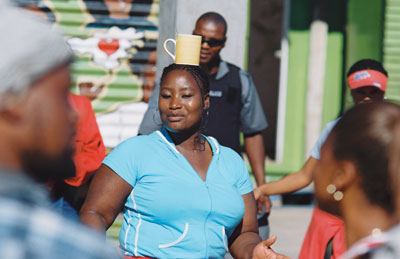THE PEOPLE’S OPERA
TOWNSHIP CINEMA IN THE NEW SOUTH AFRICA
BY SANDI DUBOWSKI
 | |
| Mark Dornford-May’s U-Carmen e-Khayelitsha. | |
“GRIM,”“GRITTY,” “VIBRANT,”“VIOLENT,” “TOUGH,” “POOR,” “SHABBY,” “CRIME-STRICKEN,” say the mass media. Black South African townships most starkly express the dreams and fears of a post-apartheid South Africa. “Still, probably less than 5 percent of South African white people have been to a township,” says U-Carmen e-Khayelitsha’s director Mark Dornford-May. “Fucking extraordinary. People say you’ll get shot, get killed. Nonsense.” U-Carmen e-Khayelitsha, awarded the Golden Bear at the 2005 Berlinale, sings, dances, loves, fights, flirts and teases its way through this black-majority African dreamscape and sends it to operatic heights.
Setting the 19th-century opera Carmen in the high-octane contemporary illegal beer halls, cigarette factories, drug smuggling gangs and police academies of the one-million-strong township of Khayelitsha and translating its libretto into the Xhosa language “seemed mad at the time — it still seems mad now,” says Dornford-May. Four years ago, Dornford-May and musical director Charles Hazelwood recruited 40 members from across South Africa — many of whom had never appeared on stage or screen or even been to the theater — after 2,000 auditions of Christian hymns, Zulu war songs, Italian arias and Frank Sinatra. They formed an extremely talented lyric theater company called Dimpho Di Kopane, or DDK (“combined talents” in SeSotho). With fiery diva Pauline Malefane as Carmen charging across the screen, always on the knife’s edge of survival, one is swept into DDK’s brilliant fusion of African culture and the most stylized European art form. The clicks of the Xhosa tongue, the dance rhythms of stomps, shimmies and swaying all make this hybrid musically and visually unforgettable.
When cinema fanatic Themba Grammery, who lives in the Alex township outside Johannesburg, heard on the radio that U-Carmen had won the Berlin prize, he presumed that it would open at the Ster-Kinekor cinema chain for R35 a ticket ($6). Given the prohibitively high price and the distance and cost of traveling to suburban cinemas in white areas, he thought he would need to wait eight months until U-Carmen came out on video. But, turning distribution on its head in an unprecedented bold move, producer Spier Films opened U-Carmen first in South Africa’s townships for R10 ($1.65) per ticket and then, after one month, in the Ster-Kinekor theaters. “If the industry is to survive we have to create films black people can relate to and screen them in places where they live,” Dornford-May said. But Khayelitsha, with one million people, has no cinema. Spier Films, under Lucinda Englehart’s lead, transformed Khayelitsha’s Oliver Tambo Community Hall into a“township cinema” complete with popcorn and DVD projection and hosted a gala premiere of 700 black, white, Indian and mixed-race glitterati. This was unthinkable before the past 10 years of post-apartheid democracy. The gala became a surprise homecoming as the closing helicopter shot of the film reveals the hall filled with 1,000 extras from Khayelitsha, amplifying the community connection.
U-Carmen is striking a deeply personal nerve for many audience members. One man traveled every day to see the film since it opened — an hour each way by combo taxi. Themba Grammery says, “I went the first night in Alex with my two sisters and we danced in the aisles. U-Carmen made me feel very proud. Pauline Malefane is brilliant.” “I see this country’s going places,” added Mjiko Vulindlu, a Xhosa singer, “seeing such amazing young talent.” Sheila Lapinsky, an antiapartheid activist who was banned by the government, was astonished after a screening in Khayelitsha. “I wept through the whole thing. The tears came with the beauty of those voices. The reality of township life is not easy. It is rough. But I had goose bumps. I just thought, This is Africa, and you can’t take Africa away from us.”
Spier’s move has caused a seismic change in South Africa film exhibition. Ster-Kinekor, on March 18, slashed the prices in 80 percent of their movie houses to R14. These 30 cinemas, largely located in malls patronized by black communities, will now be known as “Junction” theaters. The remaining other cinemas, in more wealthy white suburbs, will become “Classic” venues and tickets will remain R34. Top competitor Nu-Metro cinema chain promptly reduced their ticket price to R12. Both exhibitors face an uncertain future as Shout Cinemas announced a launch of 20 digital cinemas across the townships to give black communities an experience long denied with comfortable chairs, darkened halls, vivid images, Surround Sound, preferably local films or foreign productions subtitled in African languages, and township beverages and food such as mealies (corn on the cob), pap (porridge) and wors (sausage). At U-Carmen’s gala premiere, music promoter Jacob Zuma worried that there is “a tight contest between sport and entertainment,” and he fears film will lose out to the new generation unless township cinemas and homegrown movies are created. He then smiled and said, “But we don’t need Hollywood. We have Hollywood in Khayelitsha.
VOD CALENDAR


 See the VOD Calendar →
See the VOD Calendar →


